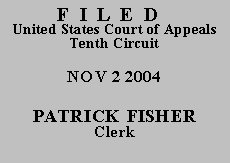

| UNITED STATES OF AMERICA, |
|
ORDER AND JUDGMENT(*)
Before TACHA, Chief Circuit Judge, and
PORFILIO and BRORBY, Senior
Circuit Judges.
After examining the briefs and appellate record, this panel has determined
unanimously that oral argument would not materially assist the determination of
this appeal. See Fed. R. App. P. 34(a)(2); 10th Cir. R. 34.1.9(G). The case is
therefore ordered submitted without oral argument.
Appellant Jose Luis Espinoza-Pinto, a federal prisoner represented by counsel, pled guilty to one count of reentry of a deported alien previously convicted of an aggravated felony, in violation of 8 U.S.C. § 1326(a)(1) and (2) and (b)(1). The district court sentenced Mr. Espinoza-Pinto to forty-one months imprisonment followed by two years supervised release. Pursuant to an Anders brief filed by his counsel, Mr. Espinoza-Pinto appeals the district court's sentence. See Anders v. California, 386 U.S. 738, 744 (1967). Pursuant to 18 U.S.C. § 3742, we decline to review the appeal of Mr. Espinoza-Pinto's sentence, and accordingly, dismiss his appeal.
After Mr. Espinoza-Pinto pled guilty, the probation officer prepared a presentencing report in which he calculated Mr. Espinoza-Pinto's sentence, determining: 1) his base offense level was 8, pursuant to United States Sentencing Guideline §2L1.2(a); 2) the base level should be increased sixteen levels to 24, pursuant to Sentencing Guideline §2L1.2(b)(a)(A)(ii), because he had been deported following conviction for an aggravated felony that was a crime of violence; 3) he should receive a three-level reduction for acceptance of responsibility, pursuant to Sentencing Guideline §3E1.1; and 4) the total offense level should be 21. Based on Mr. Espinoza-Pinto's prior criminal history, including a prior felony conviction for second-degree robbery, the probation officer calculated his criminal history level at II, resulting in a guideline sentencing range of forty-one to fifty-one months imprisonment. At sentencing, the district court followed the recommendations contained in the presentencing report and sentenced Mr. Espinoza-Pinto at the low end of the applicable guideline range to forty-one months imprisonment.
After Mr. Espinoza-Pinto filed a timely notice of appeal, his counsel filed an Anders appeal brief, alleging no meritorious appellate issues exist and requesting an order permitting him to withdraw as counsel. See Anders, 386 U.S. at 744. Specifically, his counsel points out the district court sentenced Mr. Espinoza-Pinto within the applicable guideline range, including the correct offense level and criminal history category. As a result, he suggests this court lacks jurisdiction to review the sentencing decision because the district court did not erroneously apply the guidelines or sentence Mr. Espinoza-Pinto in violation of the law. Pursuant to Anders, this court gave Mr. Espinoza-Pinto an opportunity to raise points in response to the Anders brief, to which he responded, claiming he "waived [his] deportation" at the immigration hearing without knowledge of his rights under the Immigration and Naturalization Act. Id. However, his motion clearly omits facts or information in support of his claim.
Under 18 U.S.C. § 3742(a), a sentence which falls within the Sentencing Guidelines cannot be successfully appealed unless it is imposed in violation of law, as a result of an incorrect application of the Guidelines, or is otherwise premised on facial illegality, improper calculations, or clearly erroneous fact findings. See United States v. Garcia, 919 F.2d 1478, 1479, 1481 (10th Cir. 1990) (relying on 18 U.S.C. § 3742(a)(1) and (2)). In other words, we will not review an appeal concerning a sentence which the defendant has not shown meets these criteria.
With these principles in mind and after a careful review of the record concerning Mr. Espinoza-Pinto's sentence, it is clear he has not shown the district court imposed his sentence in violation of law or as a result of an incorrect application of the Sentencing Guidelines, or that his sentence is otherwise improper under 18 U.S.C. § 3742. Instead, Mr. Espinoza-Pinto's sentence falls within the appropriate guideline range, and as his counsel points out, he was sentenced at the bottom of the applicable guideline range, about which he cannot complain. In addition, Mr. Espinoza-Pinto's pro se argument concerning his initial deportation hearing does not otherwise establish that his sentence is improper under § 3742. Because the criteria to appeal a sentence under 18 U.S.C. § 3742(a) has not been met, we decline to review Mr. Espinoza-Pinto's appeal of his sentence. Accordingly, we grant counsel's request to withdraw and dismiss Mr. Espinoza-Pinto's appeal.
Entered by the Court:
WADE BRORBY
United States Circuit Judge
*. This order and judgment is not binding precedent except under the doctrines of law of the case, res judicata and collateral estoppel. The court generally disfavors the citation of orders and judgments; nevertheless, an order and judgment may be cited under the terms and conditions of 10th Cir. R. 36.3.